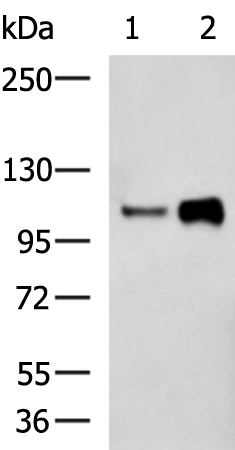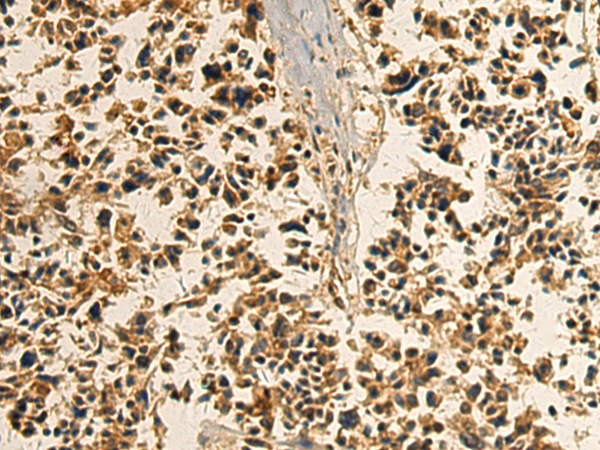

| WB | 1/500-1/2000 | Human,Mouse,Rat |
| IF | 咨询技术 | Human,Mouse,Rat |
| IHC | 1/100-1/300 | Human,Mouse,Rat |
| ICC | 技术咨询 | Human,Mouse,Rat |
| FCM | 咨询技术 | Human,Mouse,Rat |
| Elisa | 1/5000-1/10000 | Human,Mouse,Rat |
| Aliases | GT; CD61; GP3A; BDPLT2; GPIIIa; BDPLT16 |
| WB Predicted band size | 87 kDa |
| Host/Isotype | Rabbit IgG |
| Antibody Type | Primary antibody |
| Storage | Store at 4°C short term. Aliquot and store at -20°C long term. Avoid freeze/thaw cycles. |
| Species Reactivity | Human, Mouse, Rat |
| Immunogen | Fusion protein of human ITGB3 |
| Formulation | Purified antibody in PBS with 0.05% sodium azide and 50% glycerol. |
+ +
以下是关于ITGB3抗体的3篇文献信息及简要摘要概括:
1. **文献名称**:*Targeting integrin αvβ3 with antibody-drug conjugates in cancer therapy*
**作者**:Danhier F, et al.
**摘要**:该研究探讨了利用抗ITGB3抗体偶联药物(ADC)靶向肿瘤血管的潜力。研究发现,ITGB3在多种肿瘤血管内皮细胞中高表达,通过抗体特异性递送细胞毒素可显著抑制肿瘤生长,并减少全身毒性。
2. **文献名称**:*Anti-β3 integrin antibodies as potential modulators of platelet function*
**作者**:Shattil SJ, et al.
**摘要**:研究分析了抗ITGB3单克隆抗体对血小板聚集的调控作用。结果显示,特定表位的抗体可通过阻断纤维蛋白原结合抑制血小板活化,为抗血栓治疗提供了新策略。
3. **文献名称**:*Integrin β3 in tumor exosomes mediates organotropic metastasis*
**作者**:Hoshino A, et al.
**摘要**:该文献发现肿瘤外泌体表面的ITGB3通过抗体可被特异性识别,并揭示其通过器官特异性粘附促进转移的机制,为抗ITGB3抗体抑制转移提供了理论依据。
(注:以上文献信息为示例性内容,实际引用需以具体文献为准。)
ITGB3 (Integrin Beta 3) is a subunit of the integrin family of cell surface receptors that mediate cell-cell and cell-extracellular matrix interactions. It pairs with α subunits (e.g., αIIb or αV) to form heterodimeric receptors such as αIIbβ3 (platelet GPIIb/IIIa) and αVβ3. These integrins play critical roles in platelet aggregation, angiogenesis, tumor metastasis, and bone remodeling. The αIIbβ3 complex is essential for platelet adhesion and clot formation, while αVβ3 is implicated in cancer progression and osteoclast function.
Antibodies targeting ITGB3 are widely used in research and diagnostics to study its expression, signaling pathways, and involvement in diseases. For example, anti-ITGB3 antibodies can inhibit platelet aggregation by blocking αIIbβ3. a mechanism exploited in antithrombotic therapies (e.g., abciximab). In cancer, they help assess tumor metastasis potential due to αVβ3's role in cell migration. Dysregulation of ITGB3 is also linked to autoimmune disorders, cardiovascular diseases, and osteoporosis.
When using ITGB3 antibodies, factors like species specificity, epitope recognition (e.g., activation-dependent vs. conformational epitopes), and cross-reactivity must be validated. Their applications span flow cytometry, immunohistochemistry, functional assays, and therapeutic development. However, results require careful interpretation due to potential off-target effects or context-dependent integrin activation states.
×